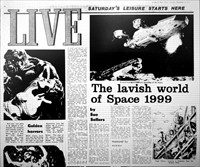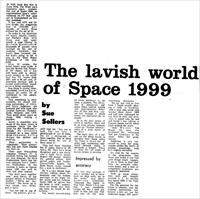UK Press
The Lavish World of Space 1999
By Sue Sellers. Liverpool Daily Post (in Granada ITV region). Ten episodes in, this is the start of December 1975. An unusual discussion of the Anderson's divorce, and the ideas for a second series, including introducing an alien (Freiberger had arrived in October, and his proposal to introduce an alien dates to 25 November; this is a little over a week later).


IF YOU think Ben Hur or Gone With The Wind were expensive epics, consider the cost of Space 1999, an unpretentious hour's entertainment on TV that goes out in Granadaland on Friday evenings.
It has cost ATV and Sir Lew Grade the staggering sum Of £105,000 per episode, or nearly three millions for the set of 24.
To make it, top American TV actors Martin Landau and Barbara Bain were flown over and spent nearly a year filming in Britain. Hundreds of thousands of pounds were lavished on the sort of modular furniture that hasn't been invented yet, but that's going to be a wow in the Ideal Home Exhibition of the year 2,000.
After 10 weeks, the series hasn't even made it into the British Top Twenty of TV shows, but it has still been sold to almost every country in the world that bas TV (more than 100) and to 90 per cent of American stations, and a second multi-million pound series is being considered.
One thing is crystal clear, something, somewhere, inspires an awful lot of confidence in the people who matter.
That something is, most probably the award winning partnership of Gerry and Sylvia Anderson, the husband and wife team who created Supercar, Thunderbirds, Stingray, and UFO. They spent three years on Space 1999, writing it together.
Gerry is executive producer of the show, Sylvia is producer. Gerry has the ideas for the "hardware" - though it's actually designed by a man called Brian Johnson. Sylvia designs the clothes and make-up.
Their partnership is unbeatable. Their partner-ship has just, three months ago, bust up.
Their joint film-making company, Century 21 is finished. Sylvia has formed her own company, Da Silva Productions; Gerry has his own company Gerry Anderson Productions. At the moment it looks as though Space 1999 may well be their last joint venture.
"We don't work together now." says Gerry, in his palatial offices at Pinewood Studios. "We're not that civilised." The break up is very recent, very bitter, and it hurts.
"You can talk to one of them." the publicity girl for ATV told me. "but not to both. You can have a photograph of one them, but not a photograph of them together. One of them doesn't mind: but one of them hates it.'
They bad been together for 17 years (Gerry is 47, Sylvia 43). They have three daughters and a son, Gerry, who is eight. Gerry senior, despite the money. despite the palatial offices with potted palms and leather Chesterfields, despite the Rolls Royce, walks around like a man in shellshock.
He is a very honest man, whether taking about his emotions and his broken marriage, or his hopes for the series and his failures. Space 1999, he agrees, has not been a total success; there are things that, looking back he would do differently.
Too much concentration on exotic hardware is, he feels, a mistake. The attraction of computers and space ships, control panels and super-sensitive detectors of this and that, cannot last through a whole series: the characters do, or should
So in the next series, if there is another, there will be an even greater concentration on "human interest." more of a soap opera of the skies.
The basic idea, of a colony on the Moon forced to abandon their home when the Moon is thrust out of orbit, and wandering endlessly through space, is obviously a winner. There is room for all kinds of human drama to develop.
"I feel that perhaps it was a mistake not to introduce an alien early on in the series." says Gerry Anderson reflectively. "Someone like Spock in Star Trek. When I first saw him was completely turned off but I got used to him and now find him one of the most interesting characters.
"On my visit to New York I found myself sitting a table at breakfast with a man who asked with interest about Space 1999 and said how impressed he was with its style and accuracy. I asked who he was and found I was talking to Captain James Lovell, who's twice orbited the moon.
"And Werner Von Braun, the man who developed the techniques that put Americans on the moon, loves the programme.
Anderson is very concerned to keep the programme within the limits of present knowledge, only very slightly extended.
It's vital for the success of the programme that those who watch it can feel such things might happen, if not to them, to their children. So scientific references books, and a host of sympathetic academics are regularly consulted.
With so much money, time, skill, and thought invested in it, its obvious that Space 1999 is far from child's play.
The big question for the future is whether, now the winning partnership has become a solo act, can the Anderson magic still work?